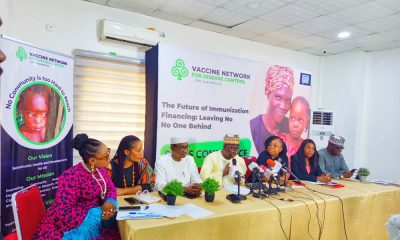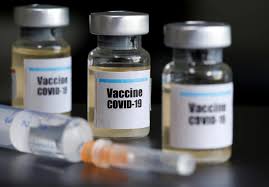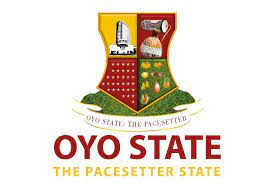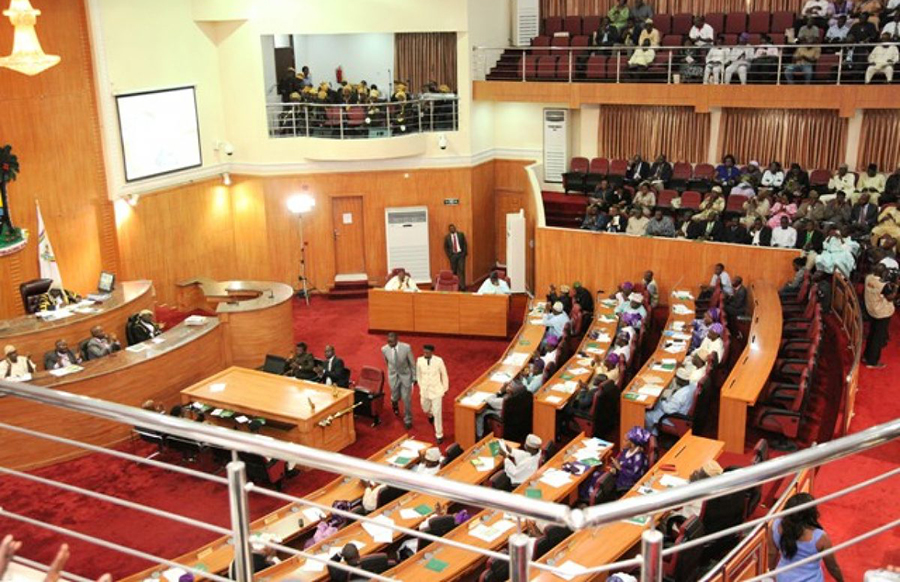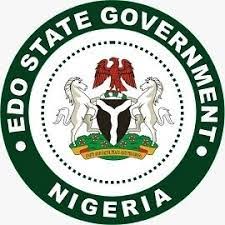Health
We Can’t Continue to Depend on other Countries for Vaccine — Fashola
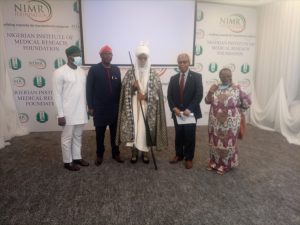
Mr Babatunde Fashola, Minister of Works and Housing, says the country cannot continue to depend on other nations for vaccines during outbreak of pandemic.
Fashola, who is the Chairman of the Nigeria Institute of Medical Research (NIMR) Foundation, made this assertion virtually during a news conference organised by the foundation on Tuesday in Lagos.
He noted that there was need to develop human capacity in medical research to proffer solution to existing diseases of public health concern and other eventual pandemic like COVID-19.
The former governor of Lagos State said the NIMR Foundation, a non-profit organisation, was initiated to raise and mobilise funds to promote medical research work that would be of benefit to Nigerians.
Fashola said: “We cannot continue as a nation to depend on other nations of the world for vaccine during outbreak of pandemic.
“NIMR was founded in 1977 with the vision to lead medical research, while her contemporary in the U.S, Uk, India and other parts of the world are undertaking groundbreaking, farsighted development via research work in biosciences and biotechnology.
“NIMR has been limited due to funds, but it might surprise you that NIMR has demonstrated clearly to come up with research works despite this challenge in the areas of diagnostic kits for COVID-19, sickle cell, therapies and remedies that are life changing.”
According to him, the target of the foundation is to raise N10 billion to kick-start the programme that will be channeled into critical areas of research.
Speaking also, the 14th Emir of Kano, Lamido Sanusi, and also a member of the NIMR Foundation Board of Trustees, said it was time for the country to have that sense of urgency to improve access to education and healthcare.
Sanusi added that the foundation had engaged the service of UTL Trust Management Ltd., a leading asset management company, to handle funds that would be raised for critical areas of research
“For us to appreciate what is going on here, we have to look beyond statistics and look at the number of human behind most of this statistics of people dying or suffering from diseases that are peculiar to people in this part of the world.
“Some of these deaths are avoidable if we have the right mechanism in place to address them, that is why an advisory board is already in place to provide direction on the research work that will be embarked on.
“The foundation will also publish its reports on a yearly basis in line with global best practice,” he said.
Another member of the Board of Trustees, Prof. Oye Gureje, in his speech, noted that there was need for the NIMR and the scientific community in the country to be nimble in its approach to research.
Gureje said that nimbleness would give researchers the ability to refocus attention and deploy previous scientific capacity and capability to proffer solution to new health challenges, such that is visible in the developed countries.
“A feature that every research organisation must have is nimbleness.
” Three years ago, nobody ever imagined that something like COVID-19 will come up, even in the advanced research world, nobody has it on their priority list.
“But nevertheless, we can see what have happen in the last 18months and this is due to the refocusing of major research organisation in the world, an unprecedented development of vaccine was achieved.
“This was made possible because these organisation are nimble and one of the ways to achieve this is to build capacity for health research in the country,” he said.
Gureje, the Nigeria Director of World Health Organisation Collaborating Centre for Research and Training in Mental Health, Neurosciences in the University of Ibadan, said most of the research work by the foundation would focus on diseases that are peculiar to Nigerians.
He said they are non-communicable diseases, sickle cell, neglected tropical diseases among others.
Speaking earlier, Prof. Babatunde Salako, Director-General of NIMR, said the foundation was initiated to address some of the challenges hindering researchers from carrying out ground-breaking research work to tackle some of the health treats to Nigerians.
He said: “Nigeria, although Africa’s largest economy with potentially the highest concentration of medical schools and universities on the continent, faces some of the worst public health challenges including the highest global burden of malaria.
“Others are high burden of HIV, tuberculosis and emerging infections such as Lassa Fever, recurrent outbreaks of cholera, meningitis and yellow fever and increasing levels of non-communicable diseases.
“This disconnect has been attributed largely to the insufficient number of world class researchers and scientists to conduct research that inform policy and development of vaccines, medicines and technologies to address the nation’s healthcare needs.
“Presently in the country, promising junior, mid-level and well-trained senior researchers are often brain drained out of the country because of lack of research funds to enable them conduct high quality research in country.”
Salako noted that there was an urgent need to reverse the challenge through a sustained funding mechanism over the next decade that would systematically train critical mass of researchers to become global leaders.
“Empowering our researchers will help them to come up with also high-quality, cutting-edge research and develop home grown solutions to our health system challenges.
“More importantly, the institute should be driving partnerships with the private sector to translate findings of research into products and evidence for improving and strengthening our health systems,” he said.
Other members of the NIMR Foundation board of trustees include, Prof. Oni Idigbe, former D-G of NIMR, Dr Olajide Sobande and Mrs Moji Makanjuola a veteran broadcaster.
NAN also reports that the foundation was established in February 2020(NAN)
Health
NAFDAC Clarifies Sachet Alcohol Ban Timeline

The National Agency for Food and Drug Administration and Control (NAFDAC) has clarified its stance regarding the nationwide ban on sachet alcohol.
Mr Kenneth Azikiwe, Director of the FCT Directorate of the agency, in an interview on Monday in Abuja that the temporary lifting of the ban was only valid until Dec.
31, 2025.He emphasised that the recent ministerial lifting of the ban was not permanent and urged the public to disregard misinformation suggesting that the government had permanently lifted the restriction.
“There is a ministerial lifting on the ban of sachet alcohol, but it is only temporary and will be reviewed by Dec. 31, 2025.
“After this date, the full enforcement of the ban will commence.
“The minister granted this temporary relief to allow manufacturers and regulators time to collaborate and ensure a more structured and effective implementation of the ban,” Azikiwe stated.”
He highlighted NAFDAC’s ongoing efforts to sensitise the public across the country, noting that awareness campaigns had reached every state.
“We have sensitised distributors, and we’ve emphasised that alcohol should not be sold to individuals under the age of 18, which is also clearly indicated on product labels,” he added.
Azikiwe also commended the Distillers and Beverages Association of Nigeria (DIBAN) for supporting the awareness drive.
He reassured the public that NAFDAC remained fully committed to regulating alcohol consumption and reiterated that sachet alcohol products containing less than 200 milliliters would be phased out after Dec. 2025.(NAN)
Health
Janabi Nominated Regional Director WHO African Region

The World Health Organisation(WHO) says that Prof. Mohamed Janabi has been nominated as the next Regional Director of the World Health Organisation(WHO) African Region.
The organisation said in a statement that the nomination was during a special session of the WHO Regional Committee for Africa held in Geneva ahead of the World Health Assembly on Sunday.
“The special session by member states of the WHO African Region to elect the next Regional Director was agreed upon and organised following the sudden and untimely death of Regional Director-elect, Dr Faustine Ndugulile in November 2024.
“Other candidates were Dr N’da Konan Michel Yao (proposed by Côte d’Ivoire), Dr Mohammed Dramé (proposed by Guinea), and Prof.
Moustafa Mijiyawa (proposed by Togo),” it said.According to it, Janabi’s nomination would be submitted for appointment by the 157th session of the WHO Executive Board, which will take place from May 28 to 29 in Geneva.
It said that the newly appointed Regional Director would take office thereafter for a five-year term and be eligible for reappointment once.
In his acceptance remarks, Janabi expressed commitment to advancing health of the people of the region.
“Thank you for your trust in me. I will not let you down. Your support underscores our collective resolve to build a healthier stronger and more united Africa.
“As we face challenges ranging from infectious diseases, noncommunicable diseases to climate change and limited health financing, we must harness African resilience and unity,” he said.
Dr Tedros Ghebreyesus, WHO’s Director-General, congratulated Janabi on his nomination as Regional Director for Africa and praised the other candidates on their campaigns.
“I offer my warm congratulations to Janabi on his nomination as Regional Director for Africa, and also to the United Republic of Tanzania.
“I also thank Dr Yao, Dr Lamine and Prof. Mijiyawa on their campaigns for this challenging but extremely important position,” Ghebreyesus said.
According to Ghebreyesus, Janabi will take the reins at an unprecedented time for the African Region, and WHO as a whole.
“We are grateful for his experience and expertise as we work together to navigate the challenges we face, and position our organisation to be stronger, sharper and more effective in the future.
” I look forward to his appointment by the Executive Board, and to working with him for a healthier, safer, fairer Africa,” Ghebreyesus said.
He thanked Dr Chikwe Ihekweazu, Acting WHO Regional Director for Africa, for his service in steering the regional office during the transition period following the end of the term of former Regional Director Dr Matshidiso Moeti.
In his remarks, Ihekweazu congratulated Janabi and wished him success as he takes up the new role.
“Congratulations Janabi on your election. This is a true reflection of the trust that member states have placed in you.
“The African region has made important strides in health. But it also faces real and complex challenges.
“You can count on my support and that of all of WHO Africa as you take on this new role to serve our people,” Ihekweazu said.(NAN)
Health
Int’l Day of Boychild: EFCC, Others Decry Impact of Cybercrime on Youth’s Mental Health

By David, Torough Abuja
The Economic and Financial Crimes Commission (EFCC) and various stakeholders have raised the alarm over the detrimental effects of cybercrime on the mental health of young boys in the society.
This was noted during the annual essay competition organized by the Great Achievers Initiative for Youth and Community Development (GAIYD) in Abuja.
The event, held in celebration of the International Day of the Boy Child 2025, focused on the theme “Boy’s Health and Wellbeing” and the essay topic, “Where are the Mentors? The Missing Role Models for Boy’s Growth and Development.
”The Chairman, Economic and Financial Crime Commission (EFCC), Ola Olukoyede, who was represented by the Commission’s head of Enlightenment and Reorientation, Aisha Muhammad, emphasized the urgent need for integrity and guidance among youth.
“Girls are just there for the enjoyment, either the boyfriends or the wives, and that’s it. They are just there as a supporters club, so the boys are the ones doing this,” she stated.
Olukoyede explained that the EFCC has established integrity clubs in primary and secondary schools to instill ethical values.
“We have zero tolerance clubs in the tertiary institutions, trying to catch them young, to instill the spirit of integrity and talk to them about what they should know, what they shouldn’t do,” he added.
The discussion highlighted the pervasive threat of cybercrime, which poses significant risks to the mental health of young boys.
The EFCC Chairman warned that cybercrime can lead to anxiety, depression, and stress.
“The issue of mental health and well-being of the male child is crucial and it is at the heart of the 2025 International Day of the Boy Child Celebration.
“The weight of secrecy, fear of detection, and potential prosecution can be overwhelming,” he cautioned.
Olukoyede therefore called for collective responsibility from parents, educators, and mentors to guide young people towards positive alternatives and foster digital literacy.
Also speaking, the wife of Ooni of Ife, Her Regal Majesty, Olori Temitope Enitan Ogunwusi, addressed the gathering, urging stakeholders to be proactive in supporting boys.
The Olori emphasized the importance of being a voice for boys. She challenged adults to reflect on their roles in nurturing boys.
“Who is going to be the voice for our boys? As a mentor, as a parent, as a guardian, are you a voice for your boy or for your boys? How have you been a voice for that boy child? For that son that you birthed?,” Ogunwusi queried.
The Olori further encouraged boys to recognize their potential and urged parents to be positive role models, emphasizing that the responsibility of raising boys falls on the entire community.
“You have God’s kind of mind. Everything that determines your future is right here in your head.”
The Keynote speaker at the event, Kayode Adaramodu addressed the critical issue of mental health, emphasizing the importance of healthy habits and open communication.
“You need to sleep well. Sleeping is very, very important. Exercising is very important. Open communication, developing open skills, positive information, embracing the good side of social media. Learning, connecting with people, and having opportunities to express yourself. These are good ways of promoting your mental well-being,” Adaramodu urged.
He therefore encouraged boys to seek professional help when needed and to utilize mental health resources available to them.
“And you can also find professional help and resources. Psychologists are there. These are people who study human behavior, the way we think, the way we feel.
“The same way you have WhatsApp, the same way you have Facebook, TikTok, and other things like that, for entertainment. To also take care of your mental health related issues, there are apps out there that can help you to become mentally alert and resourceful,” he said.
Speaking earlier, the Founder of GAIYD, Dr. Hillary Akpua, noted the need for a dedicated focus on the boy child and expressed gratitude for the growing advocacy for boys.
“If you have not been paying attention to your boys, please start doing so. Send them for training where they can develop more because the girls you are training today might meet the boy you left untrained tomorrow. I’m sure you won’t want that girl you are busy training today to marry such an untrained boy.
“In order word, for the efforts we put into raising our female children not to be counterproductive eventually, we really need to do better in raising these young men God has blessed us with,” Akpua said.
The highlight of the event was the official launch of One Boy One Skill Project by Olori Temitope Enitan Ogunwusi. The project is aimed at engaging young male adults in different vacations to empower for the future ahead.
Also, there was presentation of prizes to winners of the essay competition.
While the first position received a scholarship worth 150,000 Naira, the second position was awarded 100,000 Naira, and the third position received 50,000 Naira.
Additionally, consolation prizes were provided for runners-up and sponsored gifts for all participants.”
GAIYD, a non-governmental organization dedicated to community and human development, places special emphasis on the growth and empowerment of the male child.

